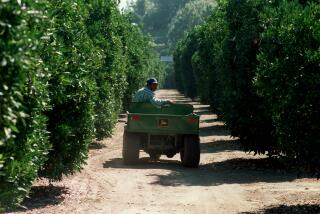California’s main squeeze
As they motored through the scorching Central Valley in the family station wagon, Mel Haynes’ nine children watched for the juice-and-fruit stands shaped like immense oranges that dotted California 99, symbolically proclaiming the Golden State’s eminence as the king of citrus.
“Those guys could spot those orange stands from five miles off,” said Haynes, 78, “and we had to stop at most of them.”
Inspired by those family memories, Haynes satisfied his own thirst 11 years ago by buying one of the giant orange stands at the southern edge of the Northern California farming town of Williams from an owner who sold it as part of a package with the motel next door.
Haynes thus finds himself the proprietor of one of California’s six known remaining “oranges,” 20th century relics that a national preservation group has named to its list of the nation’s 10 most endangered roadside places.
Over the years, most of the stands -- in Dixon, San Jose, Williams, Chowchilla, Shasta Lake and Fontana -- have been moved. Many have fallen into disrepair. None sells orange juice, although that might soon change.
Along with a Pennsylvania diner, some New Mexico hotels, a huge concrete cowboy statue in Texas and other roadside attractions that made the list, California’s vintage orange stands have felt the squeeze of weathering, vandalism, economic hardship, neglect, zoning changes and demolition.
By putting them on its first Falling by the Wayside list, the Society for Commercial Archeology, based in Madison, Wis., aims to raise awareness of once-popular but faded attractions and offer itself as a preservation resource.
A century ago, the orange was a metaphor for California sunshine, a juicy orb that signified health and prosperity. Citrus groves covered the landscape, providing a picture-perfect backdrop enhanced by the intoxicating perfume of lemon and orange blossoms.
Kitschy roadside fruit stands began popping up in the mid-1920s in the state’s agricultural areas. To entice tourists, farmers set up tables in the cool shade of trees. Motorists traveling in un-air-conditioned cars along Route 66 between San Bernardino and Monrovia and through the Central Valley could stop at these oases and pick up bags of fruit and glasses of fresh OJ dispensed by an attendant from a window in the “orange.”
Two surviving oranges, in Dixon and San Jose, were originally part of entrepreneur Frank Pohl’s Giant Orange chain, founded in the 1920s in Tracy. Over time, Pohl opened more than a dozen Giant Orange stands throughout Central and Northern California.
The eye-catching orange stands are examples of programmatic architecture, characterized by construction in the form of objects not normally used in buildings, including Randy’s Donuts, the Inglewood landmark; Tail o’ the Pup, the hot-dog-shaped stand in Los Angeles; Bondurant’s Pharmacy, a mortar-and-pestle structure in Lexington, Ky., and Longaberger Co.’s basket-shaped headquarters in Newark, Ohio.
Joe Bono, who is in his 70s, can remember citrus groves stretching as far as he could see during his boyhood in Fontana. His family settled in the area to farm 200 acres of vineyards. To help pay the bills, his mother in 1936 opened a restaurant and deli with an orange stand on Route 66, now Foothill Boulevard.
Although Fontana was known for grapefruit, Bono remembers going to local packing houses to pick up crates of oranges to squeeze for the family’s stand, one of half a dozen along the highway.
The Bono stand stayed open until late at night, a beacon for tourists driving after dark to avoid the heat. They bought oranges and lemons, olives, honey and souvenirs to take home to their families back East.
But as freeways were built, Route 66 and its motels, gas stations and restaurants faded. At some point, the Bono family’s orange -- along with most of the other stands -- was scrapped.
Bono, a retired lawyer, took over the restaurant business after his mother died in the 1990s. More than 10 years ago, the Fontana Historical Society, of which Bono is a member, got word that a stand three miles east was going to be destroyed. The society moved it to a Wal-Mart parking lot, then Bono paid to have it moved to the parking area of Bono’s Restaurant & Deli, where it still sits, restored but unused.
That could change. Bono has been remodeling the restaurant, adding a wine bar, among other changes.
He also has plans for the orange. “When I reopen this stand, I think I’m going to sell OJ out of it, like an Orange Julius,” he said.
Juice and burgers were the draw at Mammoth Orange, a roadside joint that operated for years in Fairmead, an unincorporated area of Madera County just south of Chowchilla. Larry Hibdon, a retired park and recreation director, recalls cycling there with friends.
“It was a nice 25-mile loop out to it and back,” Hibdon said. “It was a great place to stop and have some OJ and chit-chat and go home.”
The stand and restaurant were prospering until the California Department of Transportation widened the freeway and closed the exit, and the operation went out of business in 2007.
The orange sat idle until the city of Chowchilla bought it the next year with hopes of restoring it as part of a park. Those plans fell through, and the orange remains in storage. Wayne Padilla, assistant city administrator in Chowchilla, said some residents in Fairmead have expressed interest in buying it.
In Shasta Lake, a historic orange provides the welcoming hook along one side of Joe’s Giant Orange Restaurant, owned the last three years by Joe and Bertha Garcia. The spot opened in 1946 as an orange stand. The building that now houses the restaurant was added.
“We don’t serve from the orange anymore,” employee Cassie Havens said. “It’s a landmark and part of our kitchen.”
More to Read
Sign up for Essential California
The most important California stories and recommendations in your inbox every morning.
You may occasionally receive promotional content from the Los Angeles Times.










